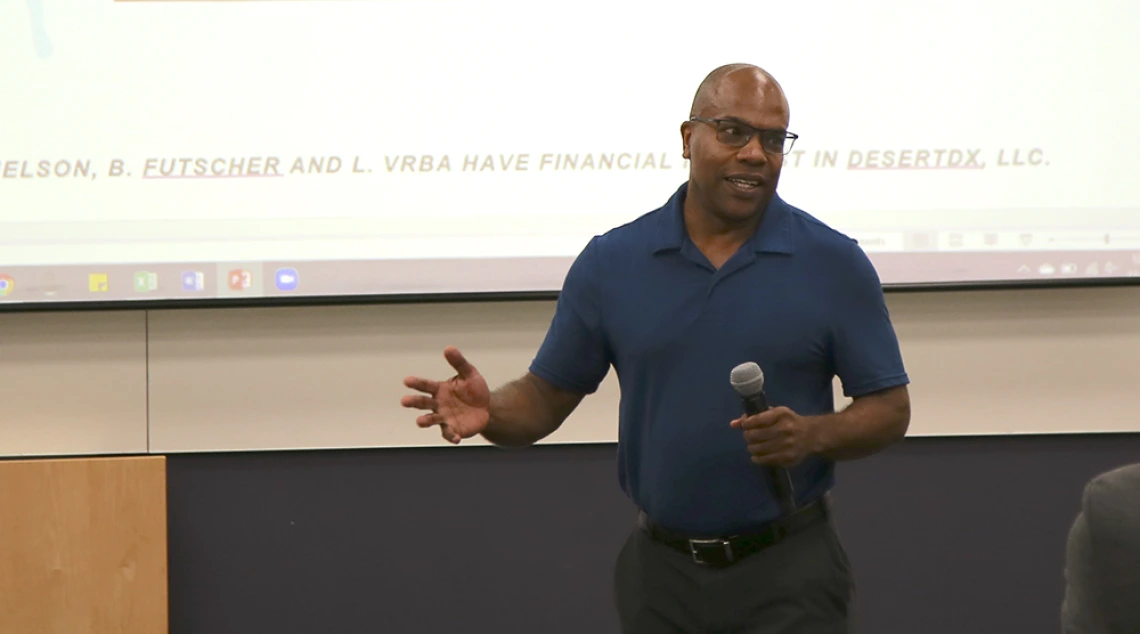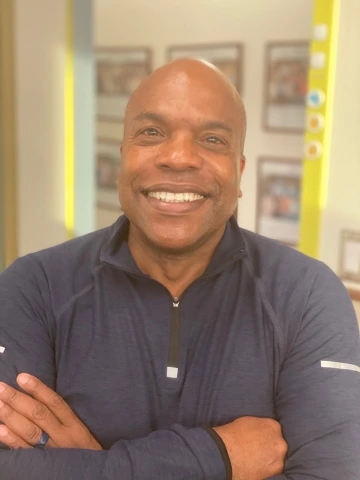Mark A. Nelson, Ph.D.: “Making a Difference for All People”
Honoring Black History Month

Mark Nelson, PhD
Photo credit: Paul Tumarkin/Tech Launch Arizona
Despite the historical setbacks – I’m thinking mainly of the 1921 Tulsa Greenwood Massacre when there was an uprising against what was at the time the wealthiest black community in the nation – and current racial inequalities, African Americans continue to contribute immensely to the business landscape of the United States. As the co-founder and CEO of Precision Epigenomics, I am emboldened by these challenges and excited to make a difference for all people in the Southern Arizona community and beyond.
- Mark Nelson, Professor of Pathology, College of Medicine - Tucson
For Mark Nelson, PhD, entrepreneurship has always been a part of his life. As a professor in the Department of Pathology at the College of Medicine – Tucson, his research has focused on inflammation, tumor progression and metastasis, cancer and genetic disease diagnosis, and racial disparities in healthcare. After obtaining a BS in microbiology and a doctorate in Pharmacology and Toxicology from Washington State University, he did a postdoctoral fellowship in molecular carcinogenesis with the late Tim Bowden at the Arizona Cancer Center.
He has gone on to build a successful academic career, which has now evolved to include entrepreneurship. Working with co-inventors Professor Bernard Futscher and Assistant Research Scientist Lukas Vrba, the team was investigating new approaches for blood tests to detect major cancers. As their work progressed, they reached out to Tech Launch Arizona (TLA), the UArizona office that commercializes inventions stemming from university research, to explore how they might maximize the impact of their work and get it into the hands of other doctors who could use it.
They connected with TLA Director of Licensing Rakhi Gibbons, who helped them through the process of filing a patent for the invention. The team continued working with TLA throughout the subsequent years, and in 2019, they launched a startup, Precision Epigenomics, Inc. (formerly DesertDX), and licensed the technology from the university.
Today, Precision Epigenomics is a molecular diagnostic clinical laboratory in the oncology space. Dr. Nelson continues his work as a research scientist at the UArizona while serving as CEO for the company.
We recently had the opportunity to catch up with him.

Mark Nelson, MD/PhD
TLA: As a researcher, why did you decide to take the path of inventor and entrepreneur?
MARK: My family originates from Tulsa, Oklahoma. I have five brothers and two sisters. My father and mother instilled in us the spirit of entrepreneurship. Although I find research and discovery very rewarding, I remember my parents telling us to strive to work for yourself.
I became an entrepreneur to take on the challenge of building a successful startup company and to help people. I believe our non-invasive molecular diagnostic technology has that potential to help those with cancer and identify cancer at its earliest stages – when treatment is most effective.
TLA: What has been your most gratifying success as you’ve worked to bring your research toward social impact?
MARK: To date, the most gratifying success for me has been to have our company selected for sponsorship in the Biz Launch competition sponsored by the Town of Sahuarita and Freeport-McMoRan. They understand what we are trying to accomplish and are supporting us at the University of Arizona Center for Innovation.
TLA: What have been the greatest challenges you’ve faced in building a startup?
MARK: The greatest challenges I've faced as CEO of Precision Epigenomics have been raising financial capital for our business, human capital, and social capital. Financial capital is essential for business longevity. Human capital refers to the personal characteristics that facilitate a person's economic advancement, such as education and work experience. Social capital refers to the networks and relationships that a person forms that can help run the business. Fortunately for me, I've have built a strong multi-talented executive team that includes Bernie Futscher, Ph.D., Chief Scientific Officer: Cory Hill, M.B.A., Chief Business Officer; Gary Clarke, P.M.D.; and Anil Prasad, M.D., Chief Medical Officer. These individuals bring significant business, clinical, and startup experience to Precision Epigenomics. My team is more than capable of helping me overcome these challenges.
TLA: Thinking about your own career and the greater social context of the moment, is there a message you have for fellow researchers who haven’t thought about advancing their impact through pathways like commercialization?
MARK: Despite the historical setbacks – I’m thinking mainly of the 1921 Tulsa Greenwood Massacre when there was an uprising against what was at the time the wealthiest black community in the nation – and current racial inequalities, African Americans continue to contribute immensely to the business landscape of the United States. As the Co-founder and CEO of Precision Epigenomics, I am emboldened by these challenges and excited to make a difference for all people in the Southern Arizona community and beyond. If you have an idea and you’re passionate about it – pursue it and take a leap of faith. Make good trouble!

